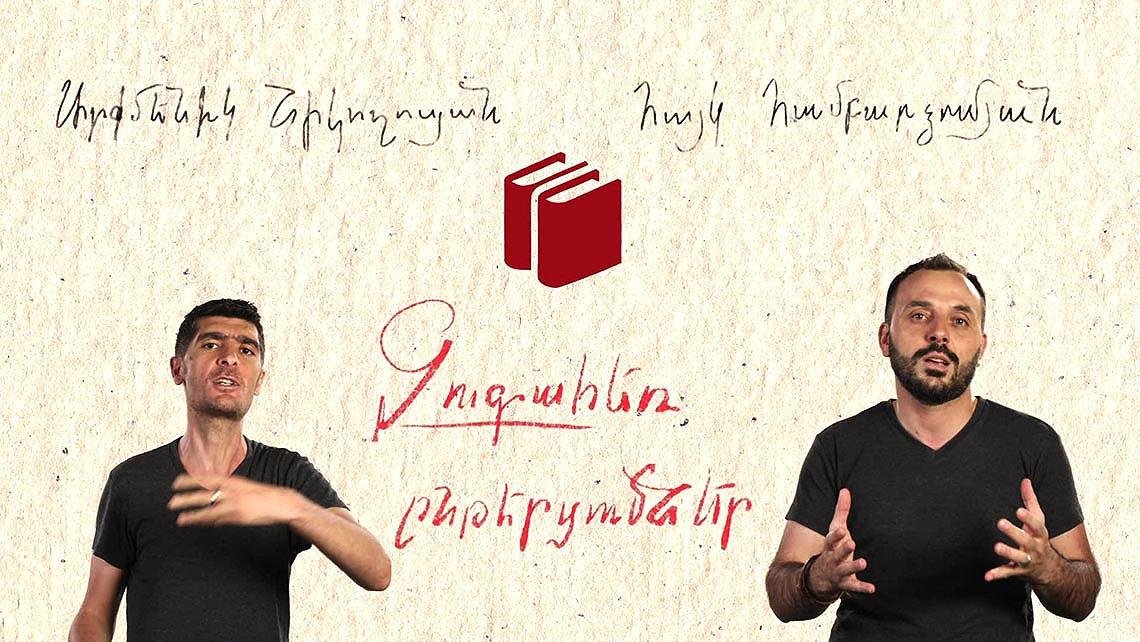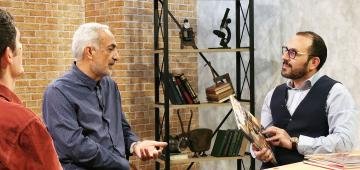
Literary critics Hayk Hambardzumyan and Arkmenik Nikoghosyan debate on the most famous, popular, and at the same time controversial works of Armenian classical and world literature. Each discussion is dedicated to one literary work, the debate of the literary critics presents the possibilities of its traditional and new perception.
 |
The charm and secrets of Hafez
The famous Iranian poet Hafez's gazelles and quatrains have enchanted readers around the world for centuries. Goethe and Pushkin, as well as our authors Charents, Isahakyan, Kaputikyan, were inspired by their mysterious world. In 2024, Hafez's new Armenian translation was published. Literary critics Hayk Hambardzumyan, Arkmenik Nikoghosyan and translator Jorzh Abrahamyan talk about the life and work of the great Iranian poet in the "Parallel Readings" program.
|
 |
Yerevan book festival. regular but...
This year, the Yerevan Book Festival will be held on September 6-8. The book-loving and reading public will have the opportunity to get acquainted with new publications, participate in various literary events and presentations. Also, traditionally, many questions arise related to the festival's activity, significance, and the literary competition held within its framework, which are discussed by literary experts Hayk Hambardzumyan, Arkmenik Nikoghosyan and the artistic director of the Yerevan Book Festival, Armen Sarkissian, on the "Parallel Readings" program.
|
 |
On the shores of Mother Araks: native rivers in literature, Part 2
The rivers mentioned in Armenian literature: Araks, Debed, Tghmut, Aratsani, Akhuryan, Getar, etc., have their own meaning at different times, from the beginning of life to a symbol of time. What are the main characteristics of these images? Literary experts Hayk Hambardzumyan and Arkmenik Nikoghosyan discuss these questions in the "Parallel Readings" program.
|
 |
On the shores of Mother Araks: native rivers in literature, part 1
Big and small rivers "flow" both in Armenian and world literature and folklore, which have many different meanings and functions in books. What do rivers in general and native rivers in particular symbolize in literature? Literary experts Hayk Hambardzumyan and Arkmenik Nikoghosyan discuss these questions in the "Parallel Readings" program.
|
 |
Children's literature today: what should our children read?
Although our life and lifestyle have changed a lot in many ways, summer vacations are still perceived as the best time to read a book for children and teenagers. Another question is whether publishers, writers and translators can provide them with suitable books. What and how is published today for children and teenagers? Literary experts Hayk Hambardzumyan, Arkmenik Nikoghosyan and children's author, translator Nune Torosyan discuss these questions in the "Parallel Readings" program.
|
 |
Armenian books that will not interfere with the vacation
What to read on summer holidays or vacations? Usually this question comes up during the school holidays, but adults also need referral lists. What to read in vacation homes, mountains, beaches and elsewhere? Literary experts Hayk Hambardzumyan and Arkmenik Nikoghosyan discuss the books that do not interfere with vacation in the "Parallel Readings" program.
|
 |
Aksel Bakunts
The 125th anniversary of the birth of the great Armenian novelist Aksel Bakunts was completed. Living and creating in difficult and tragic times, Bakunts has shown examples of patriotism and dedication in all the thunders of his activities, contributed to the development of Armenian literature, book publishing and agriculture. What was Bakunts like as a writer, farmer, translator and Armenian man? Literary experts Hayk Hambardzumyan and Arkmenik Nikoghosyan discuss these questions in the "Parallel Readings" program.
|
 |
Little heroes of adult literature, part 2
In classical and modern works of Armenian literature, minor heroes are traditionally little different from adults. They are burdened with domestic, social, and sometimes even political concerns and ideas. How and when does their childishness appear and does it exist? Literary experts Hayk Hambardzumyan and Arkmenik Nikoghosyan discussed these issues in the "Parallel Readings" program.
|
 |
Little heroes of adult literature, part 1
Armenian and international children's literature has no shortage of beloved and stellar child heroes. But there are also many books intended for adults, where the main actors are children again. Why do the authors choose child heroes, how is it possible to present big and important ideas with their eyes, speech and behavior? Literary experts Hayk Hambardzumyan and Arkmenik Nikoghosyan discuss these questions in the "Parallel Readings" program.
|
 |
Zahrat-100
This year marks the 100th anniversary of the birth of Polish-Armenian poet Zahrat. In the conditions of censorship in Turkey, how was the poet Zahrat established, what are the characteristics of Polish-Armenian poetry and what are the artistic peculiarities of Zahrat's poetry? Literary experts Hayk Hambardzumyan and Arkmenik Nikoghosyan discuss these questions in the "Parallel Readings" program.
|
 |
Why and how to portray "David of Sassoon"
We imagine the epic "Sasna Tsrer" with the illustrations of Hakob Kojoyan, Yervand Kochar, Aram Isabekyan and many other artists. Images that have become symbols of epic characters and, of course, the original text often do not allow us to imagine the heroes in a new way, and even more so, to perceive our national epic in new formats, for example, painting or comics. Why and how to portray "David of Sassoon"? Literary critics Hayk Hambardzumyan, Arkmenik Nikoghosyan and artist Tigran Mangasaryan discuss these questions in the "Parallel Readings" program.
|
 |
A poem about me. Vardan Hakobyan
Vardan Hakobyan, entering the arena in the early 70s, continued the traditional path of Armenian poetry. From the end of the 1990s, his work changed, acquiring modernist shades. What are the characteristics of the poetry of the popular poet from Artsakh, about which Vardan Hakobyan wrote and remained silent? Literary experts Hayk Hambardzumyan and Arkmenik Nikoghosyan discuss these questions in the "Parallel Readings" program.
|
